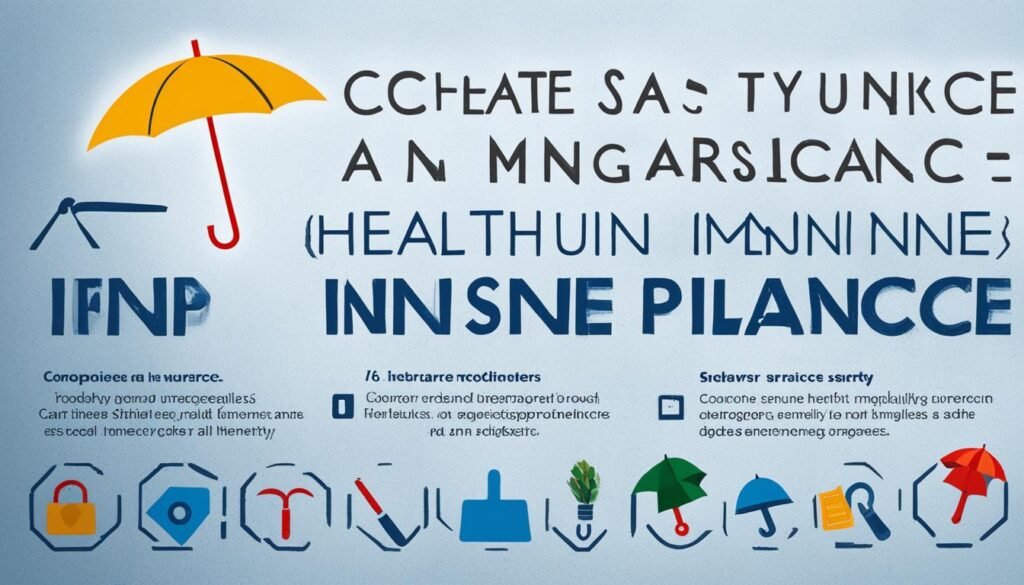Did you know the average American spent over $12,000 on healthcare in 20211? Medical emergencies and long-term care can quickly use up your savings without insurance. Insurance is key to a solid financial plan. It acts as a safety net against unexpected life events.
We’ll look at the different types of insurance and their role in managing risks and protecting assets. We’ll also discuss how to pick the right coverage for your financial future. By understanding insurance’s importance and optimizing your policy, you can feel more secure and focus on what’s important.
Key Takeaways
- Insurance is vital for protecting your finances and reaching your long-term goals.
- Various insurances, like health, life, and auto, cover different risks and protect your costs and income.
- Good insurance planning helps protect your assets, handle unexpected costs, and ensure your family’s financial security.
- It can be hard to navigate the insurance world, but knowing your needs and choosing the right coverage is key to your financial safety.
- Online tools make managing your insurance easier, helping you keep your policies up to date as your needs change.
If you’re starting your financial plan or want to improve your current coverage, this article has what you need. It will give you the knowledge and tools to protect what’s important. Let’s dive into the insurance world and find the peace of mind you’re looking for.
Why Insurance Matters
Insurance is key to handling financial risks and keeping your assets safe. It helps you deal with sudden events like illness, accidents, or natural disasters by taking over those risks2. It also shields your assets, like your home and car, and pays for important costs like healthcare, so you don’t use up all your savings2.
Risk Management
Insurance is a great way to manage risks. It lessens the financial blow of unexpected events, offering a safety net to help you recover2. By passing on risks to an insurance company, you can focus on your goals without fear of financial loss from surprises2.
Asset Protection
Insurance keeps your valuable things safe, like your home, car, and personal items. If disaster or theft strikes, insurance can help fix or replace these items, saving you from paying the full cost alone2. This is especially crucial for homeowners and car owners, as these items are big investments2.
Critical Costs
Insurance also covers big expenses, like medical bills. Without it, sudden medical costs could empty your savings and threaten your financial security3. With the right insurance, you and your family stay safe from the financial strain of medical crises or long-term care needs3.
Income Replacement
If illness or injury stops you from working, insurance can provide income support to keep you financially stable2. This is very important for those who need their income to support themselves and their families2.
Budgeting
Insurance fits into your budget to ensure financial stability. By including insurance costs, you can prepare for unexpected expenses and protect your savings4. This gives you peace of mind and helps you stick to your financial goals, even when surprises happen4.
In short, insurance is a key part of financial planning and managing risks. It protects your assets, covers big costs, replaces lost income, and keeps your finances stable234.
Types of Insurance
Insurance can seem overwhelming, but knowing the different types is key to keeping your finances safe. From health insurance to life insurance, each type has its own role in protecting your assets and covering unexpected costs.
Health Insurance
Health insurance is crucial for covering medical bills and reducing healthcare costs. You can get it from insurance companies, the Health Insurance Marketplace, or government programs like Medicare and Medicaid5. In some places, like California, not having health insurance can lead to tax penalties5.
Life Insurance
Life insurance ensures your loved ones are financially secure if you pass away. There’s term life and permanent life insurance, each covering different periods5. Some permanent policies even grow in value over time5.
Auto Insurance
Automobile insurance is a must-have in most U.S. states5. It shields you from the cost of repairs or medical bills after an accident. Lenders often require it for leased or financed cars5.
Homeowners/Renters Insurance
Homeowners insurance keeps your property and stuff safe from disasters, theft, and damage5. Renters insurance covers your belongings and offers liability protection if you rent5.
Disability Insurance
Disability insurance replaces your income if you can’t work due to illness or injury. It helps you keep your standard of living and pay bills5.
Long-Term Care Insurance
Long-term care insurance pays for nursing home care, assisted living, or in-home care as you get older. It protects your savings and ensures you get the care you need5.
Pet Insurance
Pet insurance covers unexpected vet bills for your pets. This way, you can give them the care they need without financial stress5.
Insurance is a key tool for managing risks and protecting your assets. By understanding the various types, you can make smart choices and keep you and your loved ones safe5.

“Insurance is not just a safety net, but a strategic investment in your financial future.”
Insurance and Financial Planning
Insurance is key to a solid financial plan. It helps protect your assets, manage risks, and care for your loved ones. By matching your insurance with your retirement planning, investment strategies, and financial goals, you can secure your future6.
Insurance is vital for financial planning and risk management. Medical costs have soared to 8.4% in May 2021, up from 3.8% in December 20196. Health insurance can cover these high costs and protect you from sudden medical bills.
Life insurance ensures your family is cared for if you pass away too soon. Disability insurance keeps your finances steady if you can’t work due to illness or injury. Adding these to your financial planning helps protect your assets and your family’s future.
Good budgeting is crucial with insurance. Premiums change based on your age, health, gender, and coverage type7. Knowing these factors and comparing options helps you make smart choices and save money.
Adding insurance to your financial planning builds a strong base for your future. It aligns with your retirement planning, investment strategies, and financial goals. This way, you get a plan that meets your needs and safeguards what’s important to you.
Choosing the Right Coverage
Choosing the right insurance coverage is complex. You need to think about your needs, the coverage you need, deductibles, premiums, and the company’s reputation and customer service8. It’s key to review and compare policies well. This ensures you get the right protection at a good price, with the support you need when you file a claim.
When looking at insurance policies, it’s important to know about copays, coinsurance, deductibles, out-of-pocket maximums, and premiums8. Also, consider the different types of plans like HMOs, PPOs, EPOs, and POS plans. Each has its own coverage network and costs8. Buying health insurance through a private exchange or directly from an insurer might make you lose out on income-based premium tax credits. So, it’s smart to look at all your options8.
To get the best coverage for you, compare plans based on out-of-pocket costs, coverage scope, preferred doctors, and network size89. Plans with higher premiums usually have lower out-of-pocket costs. This makes them better for certain healthcare needs9.
| Plan Comparison | Employer-Sponsored | Marketplace Plans |
|---|---|---|
| Premium Cost | Lower premiums, as employers contribute to worker’s insurance8. | Higher premiums, as most employers contribute to worker’s insurance8. |
| Coverage Network | Typically broader networks, with more in-network providers8. | May have more limited networks, requiring higher out-of-pocket costs for out-of-network providers8. |
| Referral Requirements | May not require referrals for specialist visits8. | HMOs and POS plans typically require referrals8. |
| Eligibility for Tax Credits | Not eligible for income-based premium tax credits8. | May be eligible for income-based premium tax credits8. |
When picking an insurance plan, think about your healthcare needs, budget, and coverage level needed9. Knowing the differences between plan types and comparing them helps you find the right coverage for your future8910.

“Choosing the right insurance coverage is crucial for safeguarding your financial well-being and ensuring access to the healthcare services you need. Take the time to thoroughly evaluate your options and make an informed decision.”
Open enrollment for health insurance through a government-run exchange starts in the fall and varies by state10. Health insurance plans on the Health Insurance Marketplace are in “metal” categories: platinum, gold, silver, and bronze, with “catastrophic” plans sometimes available10. Make sure the plan covers your medications and ask about copays for filling and refilling prescriptions10.
Understanding your coverage needs, comparing policy details, and using available resources helps you make a smart choice. This way, you can find the right insurance coverage to protect your future8910.
Claims Processing Made Easy
Handling insurance claims should be easy and stress-free. Look for providers that offer efficient11 claims processing and good customer support. They should also have online11 tools and strong fraud prevention to keep your info safe.
Indico Data’s automated claims processing cut manual handling by 70%11. This means faster and more efficient claims handling. Using smart tech, claims can be processed 4 times faster11. This makes customers happier by speeding up how long it takes to settle claims.
Intelligent intake platforms use AI to automate claims without needing experts11. With Indico’s tech, about 80% of claim forms can be filled out automatically11. This makes claims go faster and more accurately.
Using smart tech cuts manual work by 70%, helping insurance companies grow and automate more11. This tech speeds up getting info from medical records, making claims faster11.
Snapsheet’s platform helps big insurance companies start using claims software in just 5 weeks12. Their platform makes claims handling faster and more efficient12.

The Insurance Information Institute (Triple-I) gives six steps for filing a car insurance claim13. It’s key to tell your insurer right after an accident. For home insurance, keep receipts for any quick repairs to avoid more damage13. Health insurance often has providers filing claims for you13.
Life insurance claims are filed by the beneficiary, who must contact the insurer and gather death certificates13. Auto claims pay out differently, depending on fault. Home claims pay out based on coverage type, either to repair or replace your home13. Health claims get checked to see if they’re covered before payment13.
“Claims cycle times reduced from weeks to days using Snapsheet’s platform.”
Having a smooth claims process is key to a good insurance experience. Choose providers that focus on quick, helpful claims handling and digital tools. This way, you can protect your financial future without the hassle.
Insurance: A Safety Net for Life
Insurance is more than just a financial tool. It’s a vital safety net that gives you financial security and peace of mind throughout your life. By transferring risks to an insurance provider, you protect your assets, family, and future from unexpected events. This can derail your financial goals14. Insurance is key to a solid financial plan, helping you face life’s uncertainties and reach your long-term goals.
Insurance options like health coverage and life insurance help you manage financial risks and prepare for emergencies15. Term life insurance covers specific periods, while whole life insurance grows in value over time. This offers chances for investment and planning16. The right policy can be a lifeline, keeping your loved ones safe and your dreams alive.
Investing in insurance means you’re not just protecting your finances. You’re also gaining peace of mind by being ready for the unexpected16. It can cover funeral costs, keep your family’s lifestyle, or secure your business’s future. Insurance acts as a safety net, letting you live your best life.
“Insurance isn’t just about protecting your assets – it’s about protecting your peace of mind and your ability to live life to the fullest.”
Choosing the right insurance can seem tough, but with guidance and knowledge, you can find what fits your needs and budget. By looking at different insurance options and working with trusted providers, you can create a financial safety net. This gives you the confidence to face life’s journey, knowing you’re ready for anything.
Protecting What Matters Most
Insurance is key to keeping your family, assets, and financial stability safe17. It ensures your loved ones are taken care of, your assets stay safe, and your legacy is secure. Investing in insurance means you’re looking out for your financial future and the people you love.
AHT offers a wide range of insurance options, from property and casualty to employee benefits and retirement plans17. Their experts work with you to create plans that protect your most important things17.
Looking for insurance for your family, business, or wealth18? AHT has the experience in health, life, homeowners, and business insurance to help you make smart choices18. They’re all about top-notch service and new solutions to make insurance easy for you.
Choosing the right insurance is crucial for family protection, asset preservation, and legacy planning17. With AHT, you know your family and assets are safe from risks and set for financial stability.
“At AHT, we believe insurance is more than a safety net – it’s a strategic investment in your family’s future and the preservation of your hard-earned assets. Our mission is to empower you with the knowledge and coverage you need to protect what matters most.”
– John Doe, CEO of AHT Insurance
Insurance Online Management
Managing your insurance policies is now easy with digital tools from modern insurers. Online account access, digital policy management, eDelivery of documents, and ePayment options make managing insurance simple19. These tools, with great customer support, help you keep up with your coverage easily.
With secure online access, you can check your policy, pay bills, and update info anytime, anywhere19. Digital management makes keeping your insurance up to date easy, so you’re always protected.
Insurers that offer eDelivery of documents save you from paper work. You can get to your policy info with just a click19. ePayment options like automatic billing or online payments make managing your insurance even easier, giving you more time for what’s important.
Leading insurers give you the tools to easily manage your insurance19. By using these modern features, you get a smooth, worry-free insurance experience. This keeps your protection current and your mind at ease.
| Customer Testimonials | Savings and Benefits |
|---|---|
|
“The digital tools and features provided by leading insurers empower you to take control of your insurance coverage with ease.”
Conclusion
Insurance is key to a solid financial planning plan. It gives you the safety and security you need for the future. By knowing the different types of insurance, you can create a safety net. This helps you handle life’s surprises and reach financial stability20.
Buying insurance means you’re looking out for your and your family’s future. It covers your car, home, health, or life. The right insurance coverage offers the financial help you need during tough times21.
When you’re picking insurance, remember to check and change your coverage often. This makes sure it fits your changing financial planning goals. By staying updated and active, you can get the most from insurance. And you’ll feel secure knowing you’re ready for whatever comes next2021.,
FAQ
What is the role of insurance in financial planning?
What are the different types of insurance policies to consider?
How can I choose the right insurance coverage?
What should I look for in the insurance claims process?
How can I manage my insurance policies online?
Source Links
- https://www.vectrabank.com/personal/community/two-cents-blog/A-Guide-to-Insurance-in-Financial-Planning/
- https://www.hni.com/blog/bid/86285/7-reasons-why-insurance-is-important
- https://www.ncbi.nlm.nih.gov/books/NBK223643/
- https://www.grangeinsurance.com/tips/what-is-insurance-why-is-it-important
- https://www.investopedia.com/terms/i/insurance.asp
- https://www.forbes.com/advisor/in/personal-finance/insurance-as-the-first-step-in-financial-planning/
- https://smartasset.com/investing/insurance-planning-in-a-financial-plan
- https://www.nerdwallet.com/article/health/choose-health-insurance
- https://www.cff.org/support/choosing-insurance-coverage
- https://www.usbank.com/financialiq/plan-your-future/health-and-wellness/steps-to-choosing-a-health-insurance-plan.html
- https://indicodata.ai/claims-pillar/
- https://www.linkedin.com/pulse/insurance-claims-made-easy-overview-snapsheets-innovative
- https://www.insurancebusinessmag.com/us/guides/insurance-claims-how-to-process-to-file-and-how-long-it-will-take-428385.aspx
- https://www.mtfcu.coop/insurance-your-financial-safety-net/
- https://www.experian.com/blogs/ask-experian/how-life-insurance-can-build-generational-wealth/
- https://communityeducators.net/safeguarding-your-future-the-importance-of-life-insurance/
- https://www.ahtins.com/
- https://www.blackmountainhr.com/understanding-insurance-protecting-what-matters-most/
- https://www.mercuryinsurance.com/
- https://www.defendinsurance.eu/cz/en/insurance-conclusion
- https://www.linkedin.com/pulse/conclusion-embracing-insurance-as-investment-mindset-whole-chigwida-q8vse




This post has been incredibly helpful in clarifying a lot of the questions I had. Thank you for providing such clear and concise information.